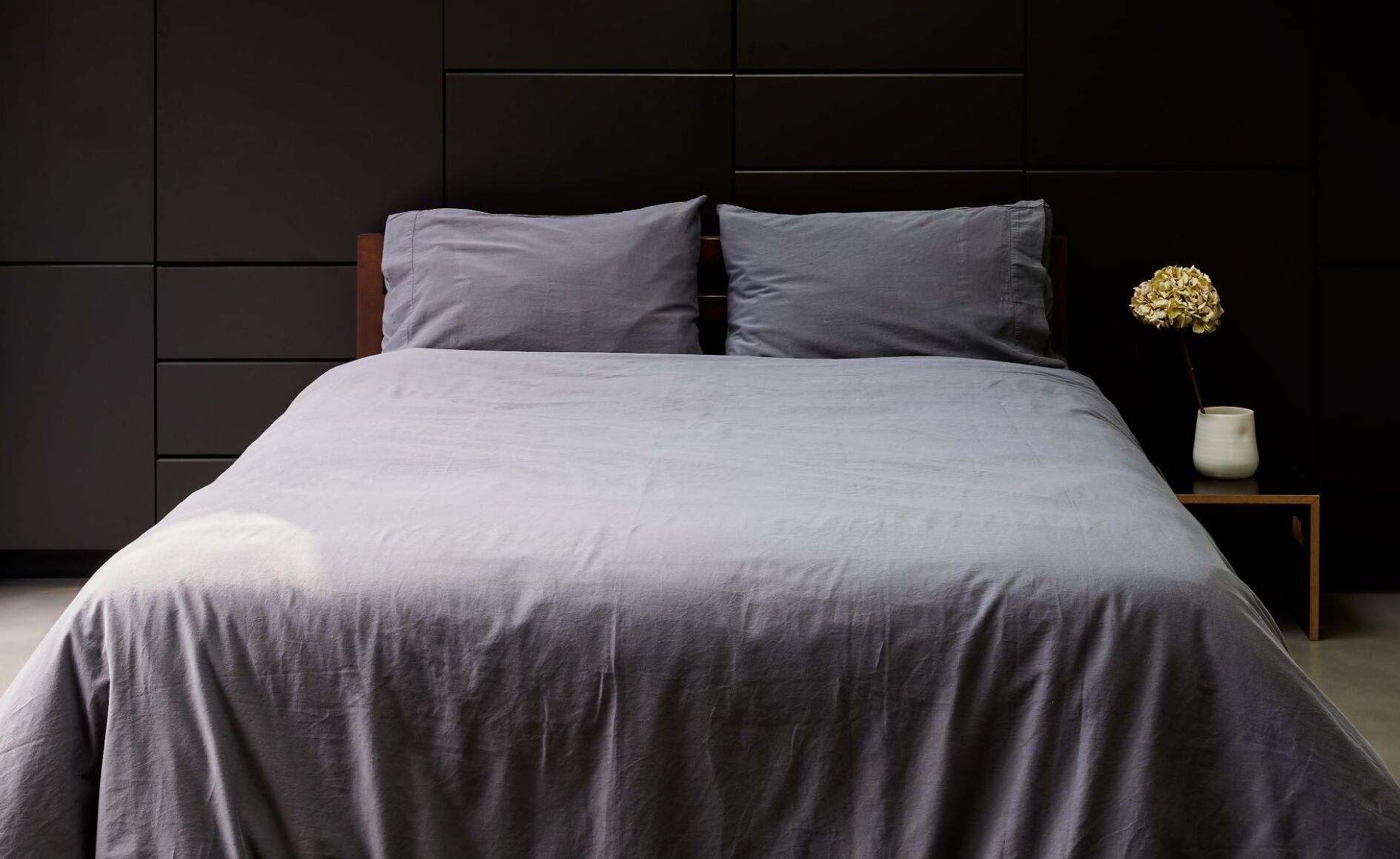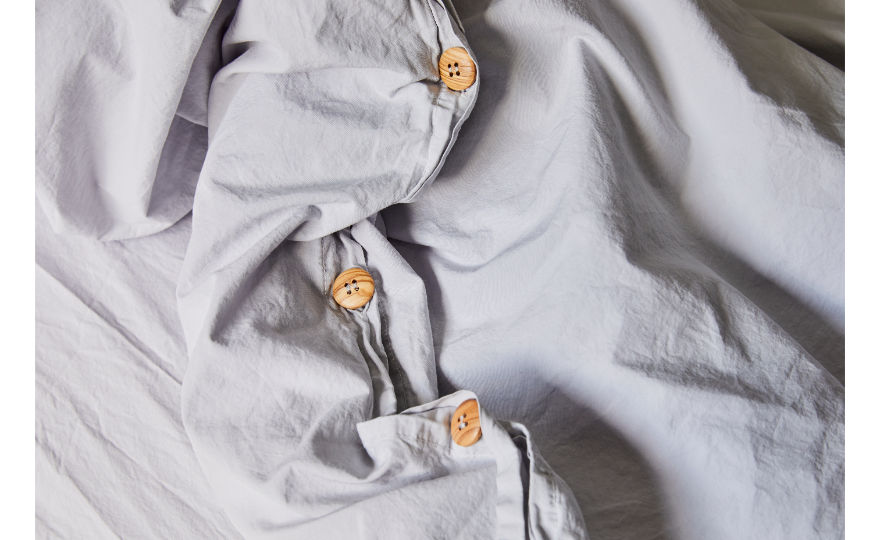365-DAY GUARANTEE | FREE SHIPPING | FREE RETURNS
365-DAY GUARANTEE | FREE SHIPPING | FREE RETURNS
365-DAY GUARANTEE | FREE SHIPPING | FREE RETURNS
Using a mattress and sheets is the most common way to sleep at night, but there’s a growing trend of people who prefer to sleep on the bed without sheet. This unusual way of sleeping might be intriguing to you, but is it recommended? Our guide is here to help dispel some of the myths and cover a few advantages and disadvantages of sleeping on a bare mattress. Let’s dive in and talk about a bed without sheets: sleeping on a bare mattress pros cons so you can determine whether it’s a good choice for your needs and for a healthy sleeping environment.
There are a few reasons why people might prefer no sheets on bed, so let’s go over these explanations first.
When you have no bed sheets, you don’t need to worry about washing them. This means you’ll have fewer chores to tackle and won’t need to take as much time out of your busy schedule to wash sheets, since you’re not using them. The popularity of minimalism is also gaining traction. Fewer or no bed sheets whatsoever can contribute to the minimalist mantra and look.
In some cases, a sheet for mattress may bother people with sensory issues. Some individuals might actually prefer to sleep without sheets so they can feel the texture of the mattress against their skin. Sleeping on the mattress only might be ideal for those who have this specific sensory preference.
If you tend to get hot or sweat during the night, sleeping on a bed without sheets might be an important personal preference for you. Sleeping on a bed without sheets might help some people feel cooler during the night, which can impact their body temperature and comfort level, improving overall sleep quality.


While it’s completely up to each person whether they want to sleep on a bare mattress, there are a few benefits to doing so.
Sleeping directly on a mattress without sheets may improve cooling on hot nights, keeping you cooler as you sleep. When your body temperature is cool, it can help to promote more restful sleep. If you’re in direct contact with the mattress, you might feel cooler than if you were to you to sleep on sheets or other bedding.
If your bed sheets keep coming off in the middle of the night, sleeping without them can help to make life easier. You won’t need to worry about re-adjusting that bottom sheet every morning when you get up. It’s also much simpler to keep up with washing sheets since you won’t have a fitted sheet to deal with when you do laundry.
For some, sleeping with fewer fabrics and less bedding can translate to fewer dust mites, pet fur, and other allergens. People with allergies and certain allergic reactions may find that sleeping without that extra sheet can provide better sleep quality since they have less allergy symptoms throughout the night.

Of course, there are also plenty of serious disadvantages when it comes to mattress sleeping without any sheets. Let’s look at a few of the cons of sleeping on a bare mattress.
Sleeping with no sheets on top my bed can lead to increased exposure to serious hygiene concerns, creating a breeding ground for all kinds of nasty stuff including bacterial and fungal growth. It also increases your exposure to sweat, dirt, dead skin cells, and body oils, which doesn’t exactly equate to a hygienic sleeping environment.
Without a bed sheet or mattress protector, your mattress can wear down prematurely. Sheets act as a protective layer between yourself and your mattress, which reduces the amount of friction and keeps your mattress in better shape for longer. Using sheets or mattress protectors (or both) is highly recommended if you want to prolong the lifespan of your mattress.
Beds without sheets also don’t look very welcoming or visually appealing. Not only are they unattractive, but they also don’t look (or feel) very comfortable to most people. When you sleep on a mattress without sheets, it can feel scratchy and uncomfortable, not to mention cause possible skin irritation.
If you have any personal hygiene or aesthetic concerns about sleeping without sheets, there are some other bedding choices available.
Use a mattress protector to help prevent premature tearing and excess wear of your mattress. These protective layers are a good compromise, and they’ll prevent you from having to buy a new mattress too early.
If you’re not a fan of sleeping on a bed with sheets, consider using them seasonally instead, or just use them occasionally based on your own personal preference. For example, you can use sheets in the winter when it’s cold, then switch back to no sheets or just one night a week during the summer.
Look for hypoallergenic bedding and breathable, non-toxic bedding that won’t irritate your allergies or cause issues. Organic cotton sheets are an excellent option. You can also look into the many benefits of linen bedding to determine which one is best to improve your comfort and hygiene for a good night’s sleep.

Here’s some more insight from sleep experts on the pros and cons of sleeping on a bed without sheet or sheets.
Sheets play a major role in your overall sleep quality. According to the Centers for Disease Control (CDC), approximately 36.8% of adults said they didn’t get adequate sleep in 2022. So, is it OK to sleep on your bed without sheets? The choice is ultimately yours, but most experts believe that sleeping with sheets regularly is the best way to ensure you get the best quality sleep possible.
What happens if you don't put a sheet on your bed? A study by Manchester university NHS Foundation found that the average person sweats 23 gallons of moisture each year, which creates an “ideal fungal culture medium.” If you don’t use a sheet on top of your mattress, that moisture is absorbed directly into the mattress itself. Therefore, sheets protect you and your mattress from all that nasty stuff we’ve already discussed.
From convenience and sensory preferences to protecting yourself and your bed from dead skin, fungal growth, and tiny creatures like dust mites, there are some pros and cons to sleeping on a bare mattress. Ultimately, it all comes down to your personal preference and unique circumstances. If you’d like to continue the discussion, feel free to share your thoughts and personal experiences in the comments below.
